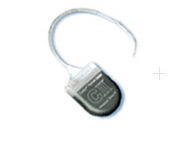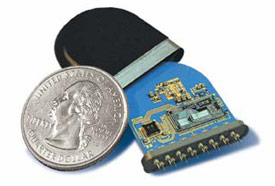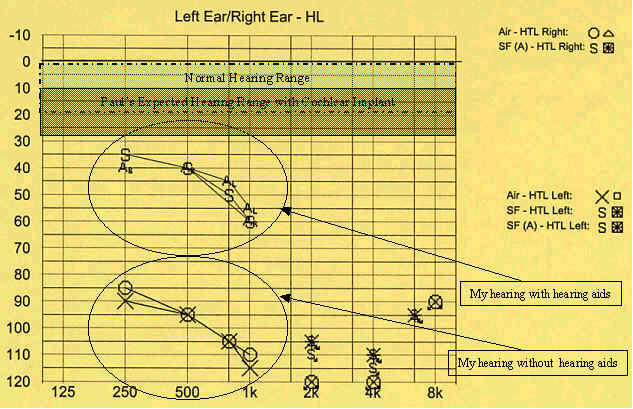

|
Paul Sommer's Cochlear Implant Journal
|
Entry #1: January 29, 2003 (day of CI Surgery)
It's 4:15am and I just woke up after a fitful sleep of no more than 5 hours, at least 8 glances at the time, and constant shifting in bed. Sure enough, the thought of the surgeonís diamond-bit cutter drilling a hole in my head is far more effective than any alarm clock. My mind is reeling and I feel the urgency to document my thoughts as I begin the next major chapter of my life.
To give you a good sense of what I'm about to have implanted in my head this afternoon, check out the following photo.
These are pictures of the internal device to be surgically implanted into my head. The chip (approximately the size of a quarter) will be placed under my scalp but over my skull just behind the ear while the cord goes through the mastoid bone (which my surgeon will drill a hole through) into my cochlea. For more detail on how the cochlear implant works, check out: http://www.geocities.com/cicentral/how_ci_works.html
For those of you who do not know me well, I was born with a profound hearing loss, which was not diagnosed until I was 13 months old. My babysitter noticed how I oddly did not flinch to a balloon popping by my ear. My parents immediately thereafter got me tested for hearing loss, which confirmed my parentsí fears. I was equipped with hearing aids two months later, which at the time was worn on the body (rather than behind-the-ear) in a harness that resembles a bra. Thankfully, the hearing aid technology progressed quickly enough so that I could wear hearing aids behind-the-ear (BTE) before my primary years of adolescence!
My parents then made the decisions and efforts that prove to be crucial 26 years later as I get the CI. After exploring various alternatives including auditory-oral and manual sign language, my parents agreed to pursue the revolutionary auditory-verbal (AV) therapy program. For the next ten years, my parents drove me all the way from Washington, D.C. (where we lived from 1975 until 1981) and Vermont (where I grew up until I went on to high school and college) to Easton, Pennsylvania (approximately an hour north of Philadelphia) where I received AV therapy from Helen Beebe and her terrific team of therapists. Helen Beebe was a pioneer of the auditory verbal therapy, which maximizes utilizing residual hearing and hearing aids to listen rather than merely read lips or sign. My parents, especially my mom (while my dad brought home the bacon), worked with me for 1 or 2 hours on a daily basis drilling me on my hearing and speech. Having received AV therapy will be crucial now because I learned how to hear to a significant extent, which makes me an excellent candidate for the CI.
With the auditory therapy and the improved technology the CI provides, I expect to be able to not just hear, but understand and discriminate sounds and words with less dependency on lip-reading. This is the fundamental expectation I have for the CI.
My other general expectations for the CI are to:
eventually become more comfortable and confident in using the phone,
better appreciate environmental and every-day sounds such as birds singing, etc. I also especially want to hear the sounds in various sports, such as the slight ping of a foul ball in baseball (which is usually too high of a pitch for me to hear now), and
better hear the noises I make myself, such as when I chew.
More scientifically, the expectation for the CI is to enable me to hear at a lower decibel level (higher up in the chart) and at higher frequencies (further to the right in the chart as you can see my hearing drops as you read across). Being able to hear at higher frequencies will likely enable me to discriminate sounds better, especially the difference between "s" and "sh." There's a big difference between sit and __it!

So you can fully gauge the meaning of the decibel levels, a soft whisper ranges from 20-40 db, normal conversations range from 50-70 db, and rock concerts are usually louder than 110 db. Essentially, I can hear the music if I go to a rock concert without my hearing aids, I cannot hear a normal conversation without my hearing aids, and I usually cannot hear whispering unless if it's right by my ear with my hearing aids on.
Now, bear in mind that while my hearing should significantly improve, it does not necessarily mean that my listening will instantly improve. Furthermore, I will not instantly know how to discriminate between "s" and "sh" because I will have to relearn how I hear and how my brain processes sounds. And then I will need to work on depending less on lip-reading. In all, I will still require significant therapy and rehab to improve my hearing to get back to where I am now with the hearing aid and then to improve from there on.
Why now? Iím finally getting the CI now for several reasons:
the technology is finally at the level I find trustworthy of investing in,
I canít keep waiting much longer for the technology to get better as I get older (after all, one can upgrade to a significant extent from a CI to who knows whatís next, especially since I have the other ear), and
Iíve witnessed the overwhelming success of the CI amongst my friends and peers.
Some of you may wonder about my position on the CI with regard to deaf culture. When I was in high school, I along with every senior, gave a 10-15 minute speech to the whole school of 400 people, including faculty. My speech, of course, revolved around my growing up with a hearing loss. Towards the end of the speech, I expressed my tremendous gratefulness to my parents, family, and friends for giving me the opportunity to be able to stand at the podium and speak for myself. I then noted that if I could take a magic pill that would make me hearing all of the sudden, I would not do so.
At this moment, although getting the CI is certainly a step in that direction, Iím not sure what I would do because my deafness made me who I am. The CI is not quite the cure to deafness. Without a hearing aid or CI, I can hear nothing unless if you yell in my ear. I also have realistic expectations that the CI will not enable me to hear, understand, and discriminate sounds and words at the level that a normal hearing person can. The CI will not make me any less of a deaf person with regard to culture. In fact, I may experience deaf culture to a much greater extent in the initial stages, especially as I relearn how to hear. It is and will be a very frustrating process, as it is for any deaf person, including myself during my earlier days, learning how to hear and speak. But as Iíve already experienced along with my peers, the patience and hard work will prove worthwhile. Finally, I believe that the CI is only one element of many thatís harmful (and beneficial!) to the deaf culture. There are many other advanced technologies, such as captioning, that are breaking down barriers and meshing the deaf and hearing into one seamless society. Captioning is an excellent example. Most bars now have TVs on with captions and more and more movie theatres show movies with captions. In all, I choose to get the CI because it will maximize my opportunities to have the best of both worlds, especially the mainstream society.
Back to the morning of my CI surgery. Itís now 5:30am. How am I feeling? Iím not nervous at all thanks to my two summers of working in the operating rooms at the University of Michigan Medical Center where I was exposed to the amazing wonders of surgery and the fact that many of my friends and peers have done well with their CI surgeries. It is comforting knowing that Iím under the knife and diamond-bit drill of Dr. John Niparko who is one of the worldís foremost cochlear implant surgeons. Heís the primary reason why Iím committed to commuting to The Listening Center at Johns Hopkins University Medical Center in Baltimore at least 7 times (two times for initial visits and audiological tests, once for the surgery, and 4 times for follow up visits for activation and programming of the CI). For those of you considering cochlear implants or any other surgery, go with the best or one you feel comfy with, especially if theyíre drilling a hole in your head! One of the major risks, although minimal, of getting the CI surgery is that the drilling takes place extremely close (within less than a millimeter!) to the nerve that controls your facial expressions. Dr. Niparko has never, in his 900+ CI surgeries (and many more of other types of inner ear surgeries) stopped one from smiling. There is a very slight risk of meningitis, but take heart knowing that this has been mitigated as I received vaccination earlier this month. There is also 1-2% chance of internal device failure.
I'm excited, yet dazed at what lies before me. Iím excited about the potential of what the CI could do for me. However, Iím realistically prepared for the frustrations and hard work that I expect to go through in the initial stages for at least a couple years.
My wife, family, and friends have been extremely supportive in my pursuits of the CI. Sarah has been wonderful about the whole CI process. Sheís been especially helpful with this matter because of her firsthand experience with hearing loss and many interactions with people who have the CI and their families, teachers, audiologists, surgeons, etc. Sheís also been very understanding and accepting of the idea of her husband turning into a bionic man. But her motives could be purely in context that Iím her guinea pig as she has expressed interest in getting the CI for herself, as well.
My family, especially my mother (naturally!), was initially and understandably a bit resistant to the idea of the CI because I have established a ďsystemĒ that works quite well for me now. This was also a key concern of mine. What I mean by "system" is that I have learned how to hear and speak using my hearing aids and used it for 26 years. By getting a CI, I'd have to relearn how to hear using a different system and then learn new sounds. But as a true employee of Accenture, one can never be complacent. One must always be willing and prepared to change for the better in order to succeed in life despite the tremendous investment. After listening to the pros and cons of getting the CI, they quickly supported my pursuit for the CI. They, along with Sarah, will be there with me at Johns Hopkins today.
The Alexander Graham Bell Association for the Deaf and Hard of Hearing (AG Bell) has also provided the most incredible network of friends, peers, and supporters. This network has enabled me to reach out to friends and peers who received or are currently in the process of getting the CI. They shared tremendous first hand experiences, information, and advice, which have been invaluable to me in the process. I was also fortunate to be able to reach out to many of AG Bell's professional members for their expertise. Without them as my supporters and guinea pigs, I donít think I would have gotten the CI myself!
Itís 6am now and itís time to get ready to leave for Baltimore!
Next (Entry #2: February 4, 2003 - six days after surgery)
| Entry #2 | Entry #3 | Entry #4 | Entry #5 | Entry #6 |